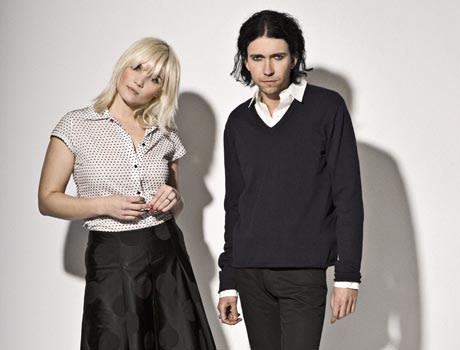There is only so far a band can take recording albums in one key, so the only place the Raveonettes could move was forward and with Pretty in Black, they have done a fine job in revitalising their limited sound. Their second album proper finds these Danes ditching their kitschy recording techniques (recording in B flat minor and in B flat major) and using their unyielding 50s obsession, influential guests and the flourishing songwriting skills of front-man Sune Rose Wagner to galvanise the music. Maintaining his black leather jacket-wearing complex, Wagner has honed his dexterity for the classics concerning love ("Seductress of Bums), heartbreak ("Uncertain Times) and just being cool ("Twilight). Also ditching the deafening Jesus & Mary Chain-heavy feedback/distortion, Wagner and vocalist/guitarist Sharin Foo have stripped down their sound to incorporate a range of influences that raise Pretty to another level. "The Heavens tackles minimal country, timeless cover "My Boyfriends Back introduces electronic drum programming and "Somewhere in Texas sounds like theyre backed by a suicidal mariachi band. Most impressive of all is their gift for roping in their heroes as legendary producer Richard Gottehrer, Martin Rev, Moe Tucker and Ronnie Spector (who graces "Ode to L.A. with her golden pipes) contribute their talent to make this not only an extraordinary album, but also a great example of how to innovate without jeopardising your sound.
There is a lot of variation on the new record. What brought on the change? Foo: We knew that we wanted to move away from the very minimalistic approach that we had on Whip it On and Chain Gang; to not make an album that was in the same key and in the same three chords. The songs were written without any noise or our pedals so when we went in to do the demos it was all done with clean guitars and we fell for that because it sounded so charming. We also chose to bring the whole band into the studio so the songs were recorded in a live kind of way, which makes it sound a bit more organic than the other albums.
What made you decide to record "My Boyfriends Back? We were asked to do it for a computer game and [producer] Richard [Gottehrer] wrote the song so it all made sense really. He recorded it back in 63 with the Angels and they had a number one hit, so we thought, "Hell, lets do it again! In the end we thought it was sweet so we put it on the album.
(Columbia)There is a lot of variation on the new record. What brought on the change? Foo: We knew that we wanted to move away from the very minimalistic approach that we had on Whip it On and Chain Gang; to not make an album that was in the same key and in the same three chords. The songs were written without any noise or our pedals so when we went in to do the demos it was all done with clean guitars and we fell for that because it sounded so charming. We also chose to bring the whole band into the studio so the songs were recorded in a live kind of way, which makes it sound a bit more organic than the other albums.
What made you decide to record "My Boyfriends Back? We were asked to do it for a computer game and [producer] Richard [Gottehrer] wrote the song so it all made sense really. He recorded it back in 63 with the Angels and they had a number one hit, so we thought, "Hell, lets do it again! In the end we thought it was sweet so we put it on the album.
